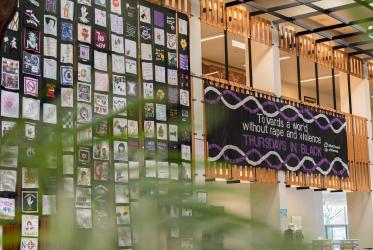Damaris, a Nigerian woman, described her experience of 2020: “We’ve gone through hell.”
Damaris and her sisters were kidnapped in March 2020 and threatened with death as their kidnappers demanded money. Her father had to sell everything and beg on the streets to meet their demands. “We are just a common people in Nigeria,” she said. “We don’t know what we did.”
Damaris’ testimony was shared during a webcast hosted by the World Council of Churches (WCC) on 26 November, during which speakers from Cameroon, Nigeria, South Sudan, Lebanon, Belarus and Colombia shared their heart-wrenching personal experiences and often harrowing daily lives to illustrate the webinar’s theme, “Conflict Zones and COVID-19: A call to compassion.”
Rev. Emmanuel Wayi, from the Presbyterian Church in Cameroon, described his own community as living in “a crisis within another crisis” as people’s health advice and treatment is hampered by fear of violence, being indiscriminately quarantined, and rising medical costs.
“The disease became a black fog that impeded decision making… and hindered the delivery of security measures,” said Lizeth Durán, a member of the World Student Christian Federation in Colombia.
In Beirut, Lebanon, Talin Mardirossian, from the Union of Armenian Evangelical Social Action Committee, noted that in a place where people are always trying to help their families and neighbors, “it was shocking when the pandemic started, that these things were forbidden and avoided.”
Elaine Neuenfeldt, ACT Alliance, who moderated the panel, reflected that conflict is traumatizing to everyone, with women and children being particularly vulnerable. “Women have been losing their jobs and their economic power and their economic role,” she said. The stories heard in the webinar should move us to action: “It must provoke a change in our faith perspective,” she said. “This is a call for our commitment, a moral imperative, an ethical attitude. What is our faith responsibility with all of this?”
Natallia Vasilevich, Centre Ecumena, Belarus, said: “I think solidarity is really important in this case. We can also share our good experiences—how we have overcome.”
Offering words of hope and commitment, Rev. Jantiku Ijasini Jamare, ACT Alliance Youth Community of Practice said: “We must put God first in everything we do. We must strive against gender inequality and gender-based violence. We must continue to trust God to overcome this pandemic, just like others in history.”
Peter Prove, WCC director of international affairs said: “We cannot say that we can’t or we haven’t seen these inequities and vulnerabilities. We must now take up that challenge of addressing them.”






